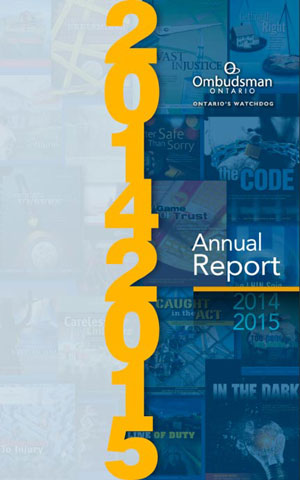The Ontario ombudsman has “serious concerns” about the possible impact of a rule putting a 10-year limit on the terms of administrative tribunal appointments, according to the annual report released by his office last week.

In the report, André Marin says his office is monitoring the impact of a 2006 directive from the Ontario cabinet that places a limit of 10 years on appointments to regulatory or adjudicative agencies. The report cites a study by the Society of Ontario Adjudicators and Regulators, released in February, warning that, if the government doesn’t alter its policy, “tribunals might be unable to fulfil their statutory mandates.
“The Ombudsman has expressed serious concerns to the government about the need for careful planning to mitigate the impact of this rule on administrative tribunals and their operations. Our Office will monitor developments closely,” the report states.
Voy Stelmaszynski, SOAR vice president, says the impact of the directive will be dramatic when it comes into effect, because many of the province’s adjudicators have already served 10 years or more.
“It will remove some of the most experienced adjudicators — the ones who are given the most complex cases to determine,” he says. “It will remove the mentoring quality that they bring to more junior adjudicators. Unless the government ramps up or speeds up its appointment process, it will leave a bunch of vacuums in tribunals beginning in early 2016.”
Among the tribunals likely to be hardest hit, according to the SOAR report, are the Workplace Safety and Insurance Appeals Tribunal and the Ontario Labour Relations Board.
By January 2017, WSIAT is forecast to lose 56 per cent of its adjudicators, and the average experience of its remaining adjudicators is forecast to drop to three from 10 years. By January 2018, the OLRB is expected to lose 48 per cent of its adjudicators, and the average experience of those remaining is forecast to drop to 3.5 from 10.3 years -.
Stelmaszynski says he believes when the government first introduced the rule, it didn’t intend to apply it as rigidly as it now appears intent on doing.
Apart from concerns that the quality of judgements could be impaired because of the loss of experienced adjudicators, SOAR is also concerned the rule will mean delays in processing cases.
“If there are fewer people, that means it’ll take longer to schedule things and longer to complete them if they go multiple days,” he says.
It may also take the less experienced adjudicators more time to hear cases.
“I think the government should stop and take a breath,” he says. “I think they should perhaps think about either staggering how they want to implement this, or offer some exemptions to it for particular tribunals that rely on expertise, and generally have more of a dialogue with the administrative justice community.”
In a statement to
Law Times, the Ontario Bar Association says it has raised the issue with the government and has had meetings to discuss options.
“Like the ombudsman, we are now waiting to see what will be done,” says the OBA.
Robert Lattanzio, executive director of ARCH Disability Law Centre, says he shares the ombudsman’s concerns.
“It’s so important that the tribunal members who sit and hear these cases have that experience, in terms of ensuring that there’s access to justice and that the right result is reached,” he says.
One of the tribunals ARCH deals with most frequently is the Human Rights Tribunal of Ontario. According to the SOAR study, HRTO stands to lose 50 per cent of its adjudicators by 2019, and have the average experience of its members drop to 3.2 from 6.2 years.
It was only recently made a requirement that members of the HRTO have a minimum amount of experience in human rights, says Lattanzio.
“The human rights bar fought to get some kind of acknowledgement in the legislation that some level of expertise was required, and there was a reason for that: We want to make sure that claimants who go before tribunals are not dealing with even more barriers than they already have to deal with.
“One of the things that ARCH finds incredibly important is that adjudicators understand disability and how disability manifests, and the type of interactions that people with disabilities have when they’re trying to access services or gain employment,” as well as the relevant legislation, he says.

 In the report, André Marin says his office is monitoring the impact of a 2006 directive from the Ontario cabinet that places a limit of 10 years on appointments to regulatory or adjudicative agencies. The report cites a study by the Society of Ontario Adjudicators and Regulators, released in February, warning that, if the government doesn’t alter its policy, “tribunals might be unable to fulfil their statutory mandates.
In the report, André Marin says his office is monitoring the impact of a 2006 directive from the Ontario cabinet that places a limit of 10 years on appointments to regulatory or adjudicative agencies. The report cites a study by the Society of Ontario Adjudicators and Regulators, released in February, warning that, if the government doesn’t alter its policy, “tribunals might be unable to fulfil their statutory mandates.